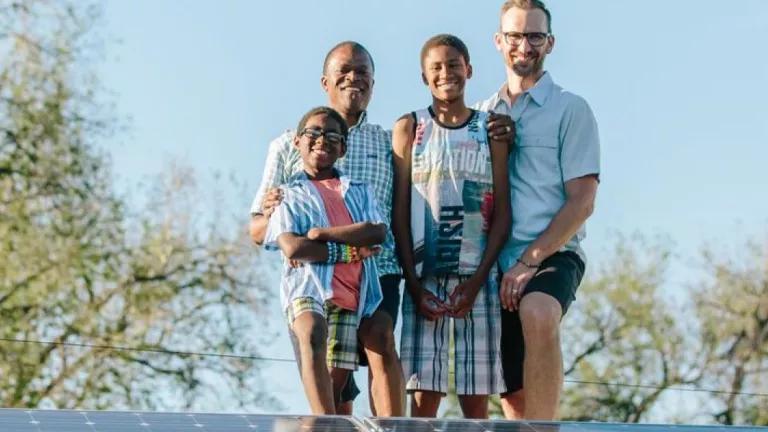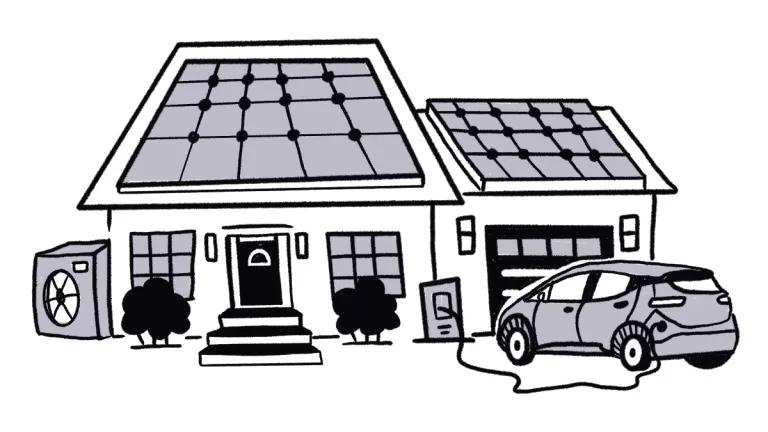Michigan's Climate Plan
It is going to take all of us to engage in solving the climate crisis. We here in Michigan now have a great opportunity to be part of the solution. Don’t wait: Weigh in on MI Healthy Climate Plan today!
Governor Whitmer's Department of Environment, Great Lakes, and Energy (EGLE) recently published a draft of its climate action plan, the MI Healthy Climate Plan, for public comment. This plan was informed by the recommendations of Governor Whitmer's Council on Climate Solutions, which I am a member of. While the plan incorporated many of the Council's recommendations and makes significant progress towards reducing energy use and emissions, it simply does not go far enough.
Commitment to Address Climate Change
The most effective way to combat climate change in Michigan is by dramatically reducing our greenhouse gas emissions across all sectors of our economy: our energy, transportation, buildings, and housing. Out of recognition of this fact, Gov. Gretchen Whitmer issued an executive directive that signed Michigan on to the United States Climate Alliance, joining more than two dozen other states committed to reducing emissions by 26-28 percent below 2005 levels by 2025.
MI Healthy Climate Plan and The Council on Climate Solutions
Gov. Whitmer executive directive also established the MI Healthy Climate Plan which serves as the roadmap for how Michigan will achieve its goal of carbon neutrality by 2050. To support the development and implementation of the MI Healthy Climate Plan, Gov. Whitmer signed an executive order to form an advisory board—the Council on Climate Solutions, to work with the agency ultimately responsible for the plan, Michigan Department of Environment, Great Lakes, and Energy (EGLE).
In less than a year of the Council’s official formation, EGLE released a draft of the MI Healthy Climate Plan for public comment. The recommendations included in the draft report focus primarily on the sectors of our economy that emit the most greenhouse gases: energy, transportation, buildings, and housing. Some of the more notable draft recommendations include:
- Adopt the 2021 Model Energy Code
- State-owned facilities will use 100% in-state renewable energy by 2025
- Implementation of the Justice40 guidelines for all climate-related spending
While these recommendations are a good start, much more must be done by each sector.
Improvement to the Plan by Sector
We know each sector will have unique characteristics and challenges, and we also know that some sectors will decarbonize easier than others. However, if our plan becomes clearer and more ambitious, we will make significant progress this decade. And it starts with understanding the current state of each sector.
Energy
Several organizations and institutions, including NRDC, Princeton’s Andlinger Center for Energy and Environment, and the Environmental Defense Fund, just to name a few, have modeled the pathways to get to net-zero by 2050. The consensus is that the power sector should go the fastest. The combination of the price of clean energy technology falling, federal tax incentives, supportive of state and local policies like renewable energy standards make cleaning the grid up much easier. Accelerating our efforts to decarbonize our electric grid now, will allow use to stay on track for our 2030 goal and focus the other sectors. We need recommendations that speed up the grid transition, such as:
- Retire all Michigan coal plants by 2030 or earlier\
- 100% carbon free grid by 2035
- 60% Renewable Portfolio Standard
Building and Housing
Another piece of the climate change puzzle lies within our homes and buildings. Improving the efficiency our home energy and heating usage will go a long way. However, not only make sure how homes are extremely efficient, but we need them to be all-electric. As our electric grid becomes cleaner and we begin use more efficient technologies to heat our homes like heat pumps, fast we will be able to reduce our GHG emissions in this sector.
- 100% of appliances sold for space heating, water heating and cooking to be all-electric by 2035 for residential and commercial buildings
- Strategies to equitably transition away from existing fossil fuel combustion in our buildings and from expansion of fossil fuel infrastructure
Transportation
The transportation sector emits more GHG than any other sector. Luckily, we have solutions to start to chip away at these emissions. We need to start investing in the transition from fossil fueled vehicles to low to zero emission vehicle. With major announces from GM to invest $7 billion in factories to build batteries and electric pick-up trucks or Ford’s announcement to increase electric vehicle production in 2023, these are the types of investments needed to transition our transportation sector. However, must this transition work for everyone. More funding opportunities are needed to support local transit agencies and schools to electrify their fleets.
- More than 50% of vehicles sold are zero-emission vehicles by 2030
- Adopt low emission vehicle and zero emission vehicle standards
- Funding to support the electrification of buses
These recommendations and others are what’s needed to get us on track to meet our GHG emission reduction goals. Despite not being including in the draft, the public comment is an opportunity make sure that these recommendations and other considerations are actually addressed in the plan.
Your Voice is Needed
Michiganders from all walks of life are needed to comment on this draft plan. It is especially crucial for those individuals who, through no fault of their own, are the least able to adapt to the effects of climate change and, as a result, experience the most severe impacts from this climate crisis.
There are two ways to ensure that your voice is considered in the final version of the MI Healthy Climate Plan. The first way to participate is to attend EGLE's virtual public hearings. Below are the hearing dates, times and registration link:
- February 8th from 6 pm to 8 pm (Link to Register)
- February 14th from 6 pm to 8 pm (Link to register)
If you cannot attend either hearing, you can still provide comments by emailing them to EGLE-ClimateSolutions@Michigan.gov by February 14th.
It is going to take all of us to engage in solving the climate crisis. We here in Michigan now have a great opportunity to be part of the solution. Don’t wait: Weigh in on MI Healthy Climate Plan today!



